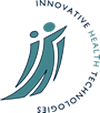Collaborative Workshop: Innovative Health Technologies Programme and GlaxoSmithKline PLC
Summary and outcomes
Introduction
The ESRC/MRC IHT Programme and GSK recently organized a joint Workshop on (hosted at GSK's Stevenage site) to discuss the interim findings and anticipated research of nine projects funded by the Programme. This is part of an ongoing collaboration between the company and the Programme. The meeting was co-chaired by Andrew Webster (IHT Programme) and Alun McCarthy (GSK).
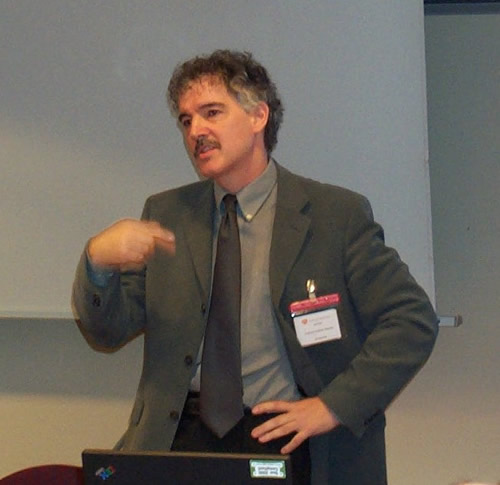
Andrew Webster
The Workshop objectives were:
- to raise awareness among GSK staff of the IHT research programme
- to explore issues that are of mutual interest to researchers and policy-makers in and outside of GSK
- to determine whether there are future opportunities that might be taken up to develop the collaboration down specific paths
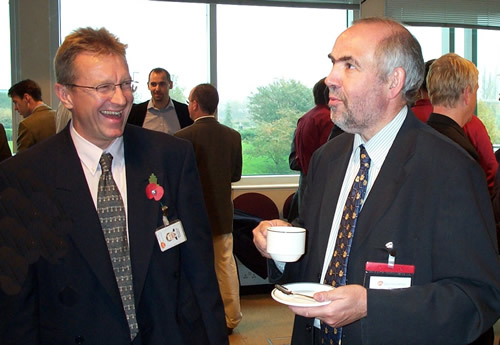
Dr Malcolm Skingle
(GSK) and Dr Richard Tiner (ABPI)
The papers were grouped into four thematic areas that are of interest to GSK's in-house areas of work: those related to clinical/health service issues; those to regulation; those focused on innovation and emerging markets for new health technologies; and those interested in the diversity of public responses towards IHTs especially as these relate to perceived risks and responsibilities.
Each of the paper's concentrated on only one or two core elements of the projects they are linked with. The key points are summarised below, as are the main questions they raised among delegates at the Workshop, which might be explored at future IHT/GSK meetings.
The researchers cited were those who actually attended the Workshop: in some cases projects have other members not listed here.
Clinical related papers
Definitions Of Genetic Knowledge & Pre-Implantation Genetic Diagnosis:
An Ethnography
Dr Sarah Franklin, Dr Celia Roberts, University of Lancaster
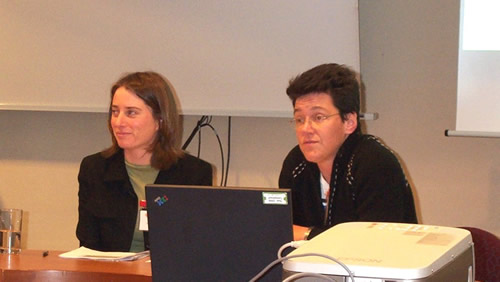
Celia Roberts
& Sarah Franklin
This project involves an ethnographic study of pre-implantation genetic diagnostics (PGD) in collaboration with clinics in London and Leeds. Its focus is on the ways in which patients and clinicians make sense of genetic risk and how this influences their decisions regarding procreation. In this paper, Drs Franklin and Roberts focused their attention on the form and nature of information that is exchanged between the parties involved, how parents recognise the difficulties clinicians face in providing enough information, and how the inevitable uncertainties are best dealt with. Linking the results to the observation made by O'Neill in her Reith lectures that 'what people want is manageable information', Franklin and Roberts suggested instead that information is not always manageable in the sense of its being quantifiable, simplified or packaged in some way; rather patients experiencing PGD seem to prefer to handle uncertain information that is difficult to manage but done so through their own efforts rather than as information managed by others. The issues raised during the discussion after the presentation included:
- The study is important in showing that uncertain, but locally managed, information is highly valued by patients compared with more top-down forms of guidance and prescription. It suggests that this is especially true where there is strong personal investment and emotional engagement by those involved- as in reproduction. In such circumstances what we might call 'affective science' might be most effective.
- Relatedly, the acceptance of risk depends on the commitment of the patient to the procedure: PGD patients may be unique in this regard but it is worth exploring whether this is generalisable. Is there a tolerance to similar levels of uncertainty elsewhere in medicine, and might this have generic implications for the way in which we deal with lay/expert relations?
- In light of the findings, the research suggests the need for new types of training for clinical staff, that goes beyond the conventional skills associated with genetic counselling.
- Finally, socio-economic background may affect the response of prospective parents to the technique.
Social Implications Of One Stop First Trimester Prenatal Screening
Professor Gillian A Lewando-Hundt, Dr Kevin Spencer, Dr Rachel Grellier,
University of Warwick
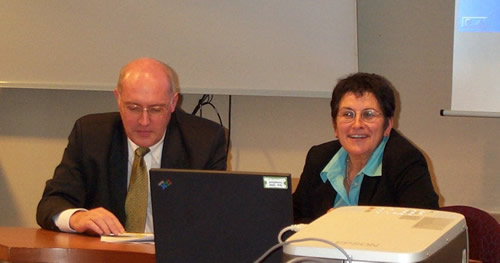
Kevin Spencer &
Gillian Lewando-Hundt
This project is exploring prenatal screening for Down's syndrome. Current policy in the UK is to recommend screening for all pregnant women irrespective of age during the second trimester (c.15-18 weeks). First trimester 'one-stop' screening uses nuchal translucency as a marker for Down's (the greater the transparency the increased likelihood of the Syndrome). This new technique promises earlier and much speedier screening and diagnosis. The project compares this new approach with the established policy, to determine their relative impact on the experience, management and inter-professional and lay/professional relationships. More generally, how does the one stop approach shape the management of risk and conceptions of self and foetal identity? Among the issues raised during the discussion were the following:
- The study will be very important in being able to compare different populations in different clinics, especially in regard to the rate of acceptance of screening
- The new procedures are quicker (both in regard to diagnosis and feedback): this enables much faster decision-making: however, we need to ask whether the pace of decision-making can create new difficulties for some couples, for whom a slower process may have value
- The project allows comparison across conventional and 'one-stop' clinics so will be able to determine acceptance rates of screening that will be generalisable: however, it is difficult to undertake a simple cost/benefit analysis of the two given the multidimensional processes involved.
The Construction Of Risk Estimates In A Cancer Genetics Clinic
Dr Lindsay Prior, Cardiff University
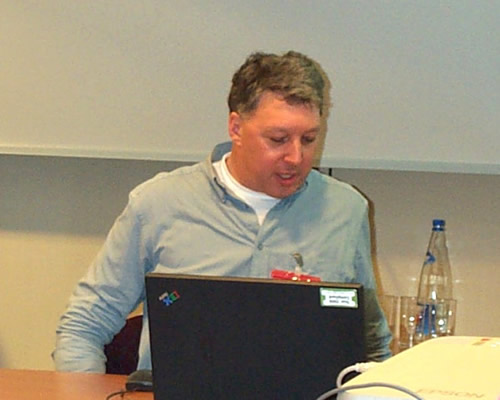
Lindsay Prior
his project provides a detailed analysis of the processes through which risk estimates in a cancer genetics clinic are determined. Such estimates of risk are based on the deployment of various measures derived from decision-support devices, expert protocols and locally determined (often tacit) practices found in a clinic. Dr Prior and his team have secured access to genetics clinics dealing with breast cancer and have data on the ways in which rules are flexibly deployed in discrete cases, showing, for example, that computer-aided support tools (such as CYRILLIC) are often discounted as being based on questionable assumptions. The project explains how the determination of a patient's risk status is sometimes dependent on non-genetic factors (such as patient anxiety), cannot be simply handled by computer protocols, and can affect the flow of resources to patients. The implications of this work (so far) are:
The crucial role that family heredity continues to play in determining risk, notwithstanding the increasing resort to molecular information at the level of genetic markers
- The need to monitor the growth and claims of commercial organisations' testing kits made direct to the public
- Breast cancer tests cold be improved by securing better samples
- Screening may create its own adverse side effects through increasing the chance of cancer via 'radiosensitive' genes.
Regulation related
Regulation Of Innovative Pharmaceuticals In The EU And US: A Comparative
Analysis
Professor John Abraham University Of Sussex

John Abraham
This project, recently started, examines the diversity and indeed inconsistency in product approval/withdrawal processes in the EU and US in regard to the same pharmaceutical drugs. It considers how these regulatory systems can respond to recent, and potential future, challenges, such as the cost-effectiveness and appropriate therapeutic use of some new innovative pharmaceuticals, which command extensive medical and public demand, and the possible introduction of greater transparency and comparative effectiveness into regulatory agencies' risk-benefit assessments of innovative pharmaceuticals.
The significance of the project is that it will show:
- The impact of distinct regulatory regimes in the EU and US on drug approval processes such that regulators and industry will be in a better position to understand the reasons why such inconsistency occurs and whether this enables us to comment on the quality of regulation in both regions
- Whether the inconsistency raises questions of rights of differential access to regulatory decisions in both regions
- How regulatory frameworks reflect differing, wider social values
- Whether decisions in the past would be made in the present regulatory context
Reforming The Governance Of Human Genetics: The Politics Of Public Trust
Professor Brian Salter, University Of East Anglia
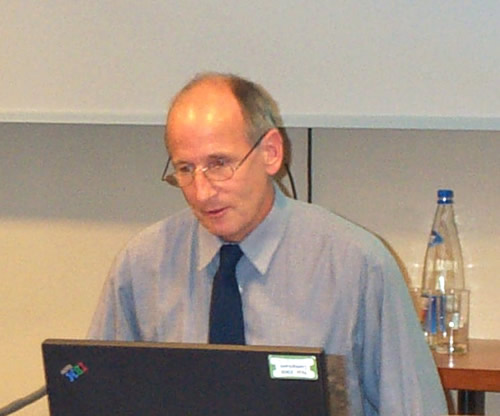
Brian Salter
Brian Salter's project is assessing the ability of the recently established advisory and regulatory framework for biotechnology to respond to questions about public trust in the human genetics field. By mapping media coverage, policy discourse and documentation, the growing importance of bioethics and the role of 'political brokers' in shaping public perception and response to genetics, the project offers an internationally comparative evaluation of the governance of human genetics. Discussion raised the following issues:
- The US appears to be more pragmatic and open in regard to biotechnology regulation
- The public perception of biotechnology cannot be seen to simply 'follow from' media messages even where we can find examples of what Professor Salter called 'media gene transfer' (the process of constructing a general story about 'genetics' that makes little scientific sense but has potential to generate concern): indeed there might not even be a 'political problem' with regard to the current public perception of the governance framework, especially in the UK.
- At the same time, where public confidence in a field of science does collapse then this will have serious implications for the industry.
- EU moves towards harmonisation will confront variation in political cultures across Europe
Innovation/market related
Consumerism, Information and Drug Prescribing Governance
Dr Nick Fox, Sheffield University

Nick Fox
This project examines the impact of the global market and internet on consumers' access to prescription drugs. The project began in July 2002 and distinguishes between OTC, pharmacy dispensed and prescription only access. The rise of 'e-medicine' and (in the US) direct marketing to consumers has meant an increasingly widespread accessibility of lifestyle drugs (such as sildenafil and supplements) accompanied by a growth in cyberchondria. The project will have key findings in regard to:
How the internet and OTC consumption makes it more difficult to map drug usage (and so pharmaco-epidemiology) and map existing and potential markets for industry
- Whether health professionals - such as pharmacists - are up to speed on these developments
- The regulation of drug advertising: how does marketing affect prescribing is a key question
- The importance of validated advice on the internet to allow for informed choices about new or existing medicines
The Impact of Genomics on Innovation in the Pharmaceutical Industry
Dr Paul Martin, Dr Paul Nightingale Universities of Nottingham/Sussex
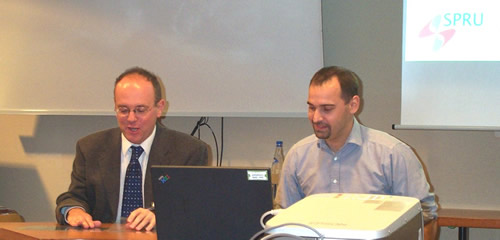
Paul Martin & Paul
Nightingale
This recently started project explores the impact of genomics on drug innovation
in the pharmaceutical industry looking at the relationship between large
and small firms, new patterns of drug discovery, and the impact on competitiveness.
The role of public policy in strengthening UK genomics will also be examined.
This project is clearly of direct interest to the pharmaceutical industry
and will provide useful information in relation to:
- How genomics makes new demands of the industry up and down stream
- In regard to the latter, how and whether in what way, GPs will decide to deploy pharmacogenetics and genomic information and diagnostics in the conventional clinical setting
- The ways in which different waves of technological innovation have shaped the academic and consumer interest in new medicines
- Whether pharmacogenomics heralds a paradigm shift in drug innovation
Public response/risk related
Xenotransplantation: Risk Identities And The Human / Non Human Interface
Dr Mike Michael & Dr Nik Brown , Goldsmith's College & University
Of York.
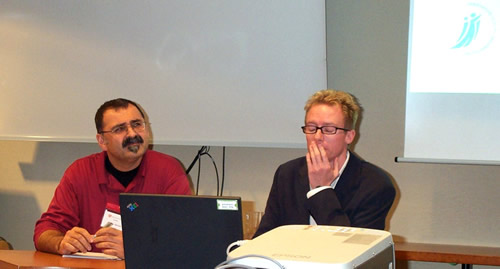
Mike Michael & Nik
Brown
This project coming to its completion mid way through 2003 has examined the emergence of xenotransplantation and the expectations and perceived risks surrounding the technique. Xeno disturbs conventions around human/animal boundaries, as well as the customary boundaries between disciplines and between diseases. Interestingly, there appear to be more cultural resistances to the human/non-human interface than there are biological ones.
A core objective is to set out how risk perception is related to shifting identification with experts and non-experts, humans and nonhumans, regulators and advocates.
In terms of the issues to be considered from the data, the following are key:
- Does the type of information that people get about xenotransplantation play a key role in its reception?
- Would an international comparison of animal activism show significant differences in the response to xenotransplantation?
- The study emphasises the ways in which cost/benefit assessments for these technologies ride on expectations that different groups of people have: those in need of substitutive medicine may well be likely to be more hopeful for the benefits of xeno than others. The project reports that such patients are especially vigilant in regard to innovation steps being taken.
- Expectations play a key role in mobilising new technologies in both existing and emerging bioscience and clinical networks: there is a co-construction of innovation across the technical and the market that has to be achieved through such mobilisation.
Overview
The eight projects that reported prompted very valuable debate. The key points for the IHT/GSK collaboration that could be usefully addressed at future meetings include:
- The dynamics shaping the evaluation of new technologies (including new drugs), at the level of the clinic, regulatory agency and the key role of prospective evaluations (future promise) for success in the market/clinic
- The determination and impact of risk calculations made at the point of clinical delivery especially with regard to codified, tacit and localised knowledge and in regard to the affordances that different time frames for personal decisions allow
- How innovation in the drugs industry cannot be understood as simply improved medical products but also wider social changes that need to be put in place too, especially in areas dependent on genetics
- Co-construction of innovation (between producers and users) must be the by-word for both the academic and industrial analyst. There may be a minimum period needed for successful innovation, especially in regard to the time needed to assimilate new technologies
- New training and education of clinical, paramedical and counselling staff is needed to meet the more complex demands and uncertainties of IHTs
- We have to be careful about the way we often tie innovation simply to the benefits said to be associated with the market: a wider definition of social benefit is just as important
- Innovation is inevitably tied in with risk and uncertainty: these may have both troubling but also valued effects for those immediately involved. How does and should this shape lay/expert relations in the clinic?
Professor Andrew Webster
IHT Programme Director
